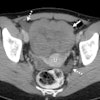
Referring providers are ordering CT lung cancer screening exams for individuals who don't meet established clinical guidelines for the tests, according to a study published September 6 in the Journal of the American College of Radiology.
This trend may reflect a lack of understanding of lung cancer screening guidelines by both patients and providers, wrote a team led by Dr. Gary Wang, PhD, of Massachusetts General Hospital (MGH) in Boston. But it may also indicate that providers are deciding to override guidelines.
"It is possible that providers have started to knowingly request guideline-discordant screening for patients without histories of heavy smoking because of the presence of other lung cancer risk factors," the group wrote.
The U.S. Preventive Services Task Force (USPSTF) recommends yearly screening with low-dose CT for lung cancer in adults ages 55 to 80 years who have a 30 pack-year smoking history and currently smoke or have quit within the past 15 years. (The task force is reevaluating whether to adjust this guideline to adults 50 to 80 years who have a 20 pack-year smoking history.)
But providers appear to be ordering CT lung cancer screening exams outside the existing recommendation.
"The potential benefits and harms of lung cancer screening for individuals with lighter smoking histories than the NLST [the National Lung Screening Trial] cohort and for those with other risk factors, including chronic obstructive pulmonary disease, radon exposure, occupational exposure such as asbestos, and family history of lung cancer, are uncertain," the group wrote. "Nevertheless, with growing public awareness and continued nationwide expansion of screening programs, lung cancer screening has started to occur outside U.S. guidelines."
To assess the prevalence of this trend, Wang's team evaluated MGH's clinical decision-support system for lung cancer screening, tracking alerts that were generated between November 2018 and December 2019 when clinicians tried to order these exams outside of Medicare coverage parameters (Medicare tends to hew to the USPSTF's guidelines, the team noted). Referring providers can overrule these alerts, so the researchers noted the number of exams performed using orders with overridden alerts.
Out of 2,248 cases, the study included 42 patients who underwent lung cancer screening with CT despite not meeting guideline criteria, for a rate of 1.9%. Of these patients, the researchers found the following:
| Characteristics of individuals who got CT lung screening outside guidelines | |
| Characteristic | Percentage who were screened |
| Younger than 54 or older than 77 | 42.9% |
| Smoker who quit more than 15 years earlier | 40.5% |
| Smoker with less than 30-pack-year history | 31% |
| Never smoked | 14.3% |
The most common reason for referring providers overriding the lung cancer screening guidelines was a patient having a family history of lung cancer (21.4%).
What's needed is better education on CT lung cancer screening for both patients and providers, according to the group.
"Our analyses found that perceptions of lung cancer risk from both patients and referring providers contributed to guideline-discordant screening use," the team noted. "This suggests that it may be useful to provide resources that can guide both groups on the assessment of lung cancer risk, especially within the context of weighing potential benefits and harms of screening."





















